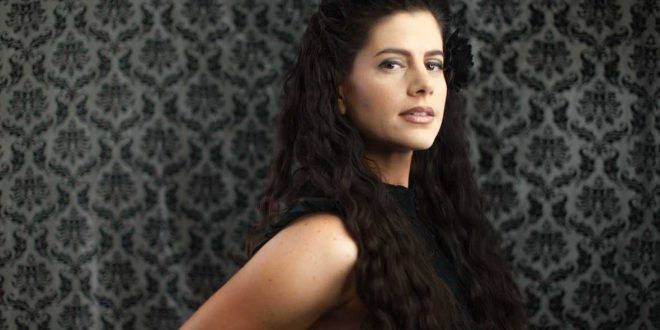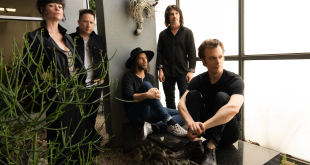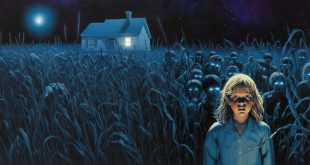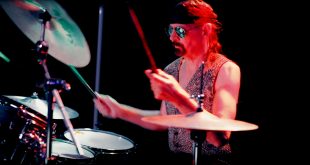Katie Knipp is an acclaimed, multifaceted blues rock musician hailing from northern California. Honing her indie craft since the late 90s, the singer/songwriter’s solo act transcends such stature. Poignant as it is undeterred, Knipp has thus earned a host of slots opening for the greats – everyone from Robert Cray, to The Doobie Brothers, to Jon Cleary. Her latest album, Take It with You, is a testament to her assiduous work ethic, as it reached #10 on Billboard’s blues chart as well as #9 on the Heatseekers pacific chart, both feats essentially occurring at the same time.
I had the pleasure of speaking with Katie to discuss her formative musical experience, the processes behind her new album, and, among other things, how parenthood has come to benefit her outlook on life.
ME: When you were growing up, you made the transition from singing in choir to playing piano. Did you enjoy both settings from the get go?
Katie: Yeah, of course! At the time, I could only choose between band or choir, and singing was my first love. When it came to the piano, I didn’t have a piano at home to practice on, but I loved playing on one in my high school. I used the sight-reading skills I’d acquired from choir to teach myself piano, using the one in the band room. I think I started doing this around the age of 16. Every lunch break, I’d go in there and figure stuff out. It just felt so good. It might have been nerdy since I wasn’t really hanging out with a lot of friends; I would just go straight to the band room (laughs)! But whatever, my nerdy friends understood.
In college, I decided to get a music degree with emphasis on vocal performance. No matter what your instrument is, you have to master a strong, intermediate level of piano to apply all that theory. By that time, I’d also gotten an amazing private piano teacher outside of college, and he would bring me up to speed.
ME: From what I gather, you’d previously pursued a degree in medicine before switching to music. How did that transition play out?
Katie: At that time, I was working as a lifeguard, and thought it’d be cool to, you know, ‘saaave liiives’ (laughs). So, when I was 18 years old, I was enrolled in 6:30 AM chemistry, genealogy, and all these classes that fit within the degree. However, I also signed up for choir class. In that same first semester, I walked into choir class, Jake, and they were doing Mozart’s Requiem; I just started to cry! It was such a beautiful piece of music and I thought, “You know what? Even if there aren’t any guarantees of money, I have to follow my heart,” and I switched majors, right then and there; I just knew.
ME: It was truly a revelation for you, in that sense. How did you feel in that moment?
Katie: I was overcome by that sensation, and I also had that little ‘come-to-Jesus’ moment where I figured my personality type is too emotional anyway to deal with, as patience died on me. I’m an artist, so I just had to come to terms with that, you know?
ME: Another aspect, though darker in tone, ultimately helped kickstart your musical output, and that was a suicide that happened on campus at UC Santa Cruz. Who were you listening to at that point, musically?
Katie: I had just started teaching myself guitar, and was learning a couple songs by Jewel, remember her?
ME: Of course!
Katie: Yeah, some of her songs, and then Kris Kristofferson’s “Me and Bobby McGee.” Then, “Down in Montgomery” by John Cray, which Bonnie Raitt made famous. Those were the first songs I was learning. I’d also had this preliminary deal with a startup label. Once they told me, “Oh, we’ll send songwriters for you,” that was another lightbulb moment that made me say, “I can do this myself; I have a brain,” you know? Of course, a lot of other things started to happen, like the suicide, which pushed me to write in order to process these things.
ME: Were you recording music at that point?
Katie: Yeah, just some demos, but not anything that’s posted online, thank God. When I look back, that stuff sucks (laughs)!
ME: From there, did you eventually aim for a specific set of influences as you became more competent?
Katie: I honestly just wanted to get songs written so I could sing and play them by myself. I was playing rhythm guitar, and I’m still very simple about my approach. But now, I have a whole new love affair with my Dobro Resonator slide guitar. I like that I can have some lead parts intertwined with some rhythm. As far as having specific guitarists who influenced me, that wasn’t until recently. One of those is Keb Mo; I really like his slide playing. And then, going way back — to Son House, Lightnin’ Hopkins, and people of that era. It’s great to kind of become a new fan now that I’ve acquired such a love for the slide Resonator sound.
ME: All of that accumulates into your fifth album, Take It with You. Prior to that, your only output was jotting down notes at 3 AM, after being busy with your kids. How did you get around that?
Katie: I would write lyrics in stream-of-consciousness style. I’d think of a line, and then type it out, as if in a state of emergency, onto my phone (laughs). Or, sometimes I’d write things in a book that was nearby, and then just fill in the blanks when it came to putting the songs together.
ME: With members of self-taught and formal training backgrounds, it’s common that they clash, and focus too much on differences, rather than unity. How did you finally find a suitable set of musicians that get what you’re about?
Katie: I think my maturity level developed in such a way that I attracted the right people, and without trying too hard. I play solo a lot, so I’d met these guys at my shows. My drummer approached me and was super enthusiastic. Someone referred my bassist to me, actually, but he’s such a smart guy who also has a music degree. Then, I’d played a Songwriters in the Round gig with my lead guitarist who you hear on five of the songs on the album, and we all just hit it off. I always say, the nerdier, the better. I love it when musicians have music degrees, but especially when they play from the heart. I think I’m finding those types of people easier now, since I’m more honest with myself in my own spiritual way. It’s like the law of attraction, where ‘like’ attracts ‘like,’ you know? In the past, I felt that I was forcing it; now, not so much. But in general, I’ve been forced to have more patience since becoming a new mom (laughs).
ME: What ends up bringing this album together is its production. A lot of modern music, even in the underground, sounds rather squelchy, but this is made raw, and the real deal. How did that come together?
Katie: Chris Horton was co-producer and engineer, while Ben Nieves was executive producer. They both work out of The Recording Place, which Ben owns. Chris and I work so well together, and I think that’s what makes this album what it is. He really gets the best performances out of me, and isn’t afraid to show me where I can improve. And he really did! Many times, he was like, “Eh, I think we should do one more take,” and I’d say “Fiiine” (laughs)! But our egos never got in the way. It was so easy, and he really made sure to treat each song as its own story. Each song kind of lived in its own house. When he was mixing the album, he made sure to live in each individual story; he didn’t do the same stuff on each song. You’ll hear different effects depending on what story you’re in. He’s brilliant, and I think he has a great career ahead of him, actually.
ME: A turning point was going back on stage for your mini tour with Robert Cray. Did you feel those nervous jitters come back?
Katie: Oh, I totally did! I haven’t opened for anyone famous in a big theater venue in years, just little clubs around town. At first, I was very nervous. Luckily, when I got the gig, I was informed three months in advance. This is probably going to make you laugh, but I actually started meditating, just to get my mind right, with things like positive affirmations.
Say you’re performing and you make a mistake on stage. You have a choice mentally to dwell on that and continue toward a downward spiral. Or, you could move on, since your mind is otherwise dialed into a positive outcome. I’d listen to this positive affirmation — it’s only five minutes a day, but it really changed the game. If we want to get into quantum physics for a second, your subconscious is like 90 percent of your brain, so you’re consciously only using 10 percent, from a mental standpoint. All of that meditation gets your subconscious up to speed, because everything you think about, you bring about. If you’re thinking, “I hope I don’t screw up, I hope I don’t screw up,” chances are, you’re going to! But if you’re thinking, “I am so happy to be here right now; this feels so good; this is so much fun; I’m gonna sing the shit outta this,” everything comes together. The Fox Theater? Are you kidding me? And opening for legends! I easily could have been in a negative spiral of, “Oh, I suck at guitar,” but the thing is, there’s only one of me out there. I’m not trying to be the world’s best guitar player; I am just trying to be me! The more you can think about that staff, the more everything‘s OK. You essentially become friends with your audience and invite them into your world.
ME: Yeah, exactly! And a testament to that is your album reaching #10 on the Billboard blues chart, as well as #9 on Heatseekers. Did that surprise you?
Katie: That shocked the hell out of me! Some of these shirts, you have to be a subscriber to even see. What’s funny is that the blues chart only goes up to number 15, so I’m really lucky to have gotten on it at all. My original goal was to have a strong presale campaign to get on the Heatseekers chart, which is like, “Pay attention to the newcomer person!“ So, when I saw it on this additional chart, I almost passed out (laughs)!
ME: You strive for that level of success even while at home, which can be done nowadays. In your 20 years as a musician, as well as being a recent mother, what have you learned?
Katie: I learned that when you’re fully immersed in gratitude, and with everything coming from a place of love, life becomes a little easier. When I was caring for my babies as newborns, I honestly got pretty depressed at times because there was no music to be had. I was breastfeeding around the clock. It was hard and a big transition for me. So, I focused a lot more on gratitude. Every time I got just a minute of practice, that minute I was so thankful for. Before I had kids, I would spend a lot of time watching TV, and with other frivolous indulgences that took me away from it. It wasn’t until these past couple years that being thankful for any second I get to do what I really love just changed the game. It made when I write and practice come from a peer place. There’s no time for BS, or write a song that I won’t like, but someone else will. There’s no time to do anything that’s not 100 percent me, if that makes sense.
ME: Lastly, anything you’d like to say to the fans?
Katie: Thank you for your support. I find myself saying ‘thank you’ so much, but I really mean it. Thank you for buying my music. I’m still selling it on CD and digitally wherever it’s sold, and it’s pretty easy to find.
Katie Knipp Socials:
 Music Existence Because of Music, We Exist
Music Existence Because of Music, We Exist



